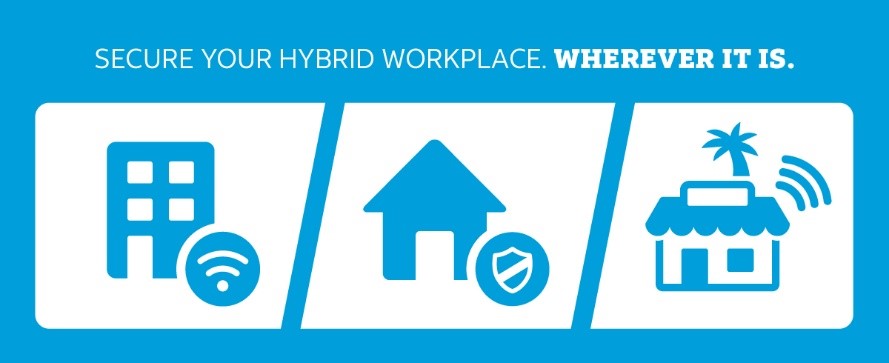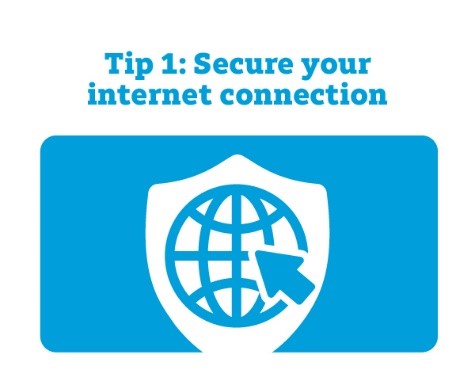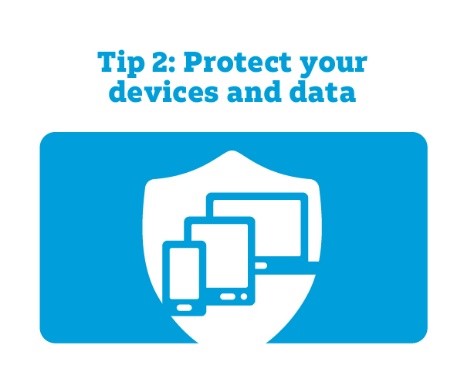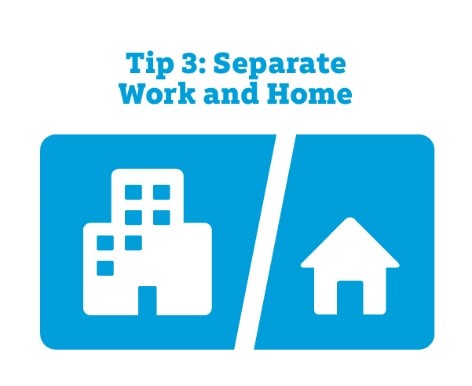
People are now working from an office, their home or just about anywhere. We found ways to do this – or were pushed into them – by the pandemic. Some people turned homes into offices and found themselves working alongside family or pets, instead of coworkers. This may have seemed temporary, but the hybrid work environment is going to be more permanent and widespread for employees and companies in the future.
According to a recent PricewaterhouseCoopers survey, 69% of business executives reported their employees will continue to work remotely in some capacity. This makes setting up a more secure, permanent and reliable work environment more important than ever – one that travels with you and is consistent wherever you are doing your work.
While specific needs and available support will vary between employees at large companies and those who are self-employed or at small businesses, here are some security tips to consider when you log in for work.

Tip 1: Secure your internet connection
Whether it’s in your living room, your favorite coffee shop or your office, if you have an internet connection you may find yourself working. At these times, making sure this connection is secure and reliable will help you be safe, not just productive.
- If you use your internet provider’s Wi-Fi gateway – the one that came with your service – it should make any necessary security updates automatically. But if you purchase your own modem or router, or you install items like a Wi-Fi coverage extender behind it, you may need to keep them updated yourself. Check with your service and equipment providers.
- Make sure you have a strong password on your WiFi network, and be careful who you share it with. This will help ensure only you and your approved devices have access to your connection, keeping others away from confidential work. You can learn more about managing your home network in this blog.
- Use a virtual private network (VPN) to protect your data when you are not connected directly with your company network. If you are on public Wi-Fi, the VPN hides your data as it moves through the open connection, making it harder for bad guys to intercept the information or get into your device. If your company provides a VPN, use it. If you need your own service, look for a VPN that encrypts information – not just one that transmits it “anonymously” – and uses multi-factor authentication to protect access.
- There are more tips about working with public Wi-Fi here.

Tip 2: Protect your devices and data
It’s your connected devices that allow you to do your work wherever you want. So, protecting them is very important. This includes from low-tech dangers, such as dropping them or leaving them somewhere.
- Regularly updating your devices’ software helps keep them secure. Making this device hygiene a habit can help keep your device secure and help it work better. Consider setting up automatic updates and connect your devices to a known, secure network when possible.
- Routinely store backups of your files to protect them from loss or theft. If you use a cloud service, use a reputable service and use multi-factor authentication, if offered.
- Keep your eyes on your devices, wherever you are. Don’t leave your phone or laptop unattended in a public place. This is just an invitation to a thief. Even if they don’t take the device, they may take information. And remember to take your devices with you when you leave.
- Be aware of people around you. Watch what you say and who can hear it. Consider what is on your screen and who can see it. In public, someone can read over your shoulder. A phone call or video conference can be overheard. You can learn more about video conference security here.

Tip 3: Separate Work and Home
It’s very easy in this hybrid work environment to blur the line between your professional and personal life. Defining these two spaces can help reduce security risks in both areas.
- Keep your work devices for work and personal devices for personal use. Having your bank information saved on your work computer or opening work email on the home laptop may be convenient, but it increases the risks to both. Take a moment to do the work on the appropriate device.
- Set boundaries for family and roommate. Make sure they know not to use your work devices and to keep the home devices clean of work files. To protect your internet access, you may also need to establish guidelines to prevent someone’s game playing from disrupting your important client video conference.
In all cases, use reputable security services. Your internet and cellular provider, as well as your employer, likely have recommended security services for use in the hybrid work environment. Check with them to see what is available to you. Some may be free or come at discounted rates.
If you work for yourself or at a small business, you may handle multiple roles – including security. Using reputable security services can help keep your data safe while easing your workload. Learn what you can about the services and consider that free services may still require something from you in return, so read the terms and conditions carefully to make sure data is only visible to parties you know.
You can learn more about AT&T support for consumer and business customers by visiting ActiveArmorSM, 24/7 proactive security that helps stop threats before they get to you. For instance, the AT&T Mobile SecuritySM app offers a VPN connection (Public Wi-Fi Protection) for no extra cost on the AT&T Unlimited ExtraSM and EliteSM plans, and it will notify you if your device’s operating system is outdated.
These additional resources are also available on Cyber Aware: